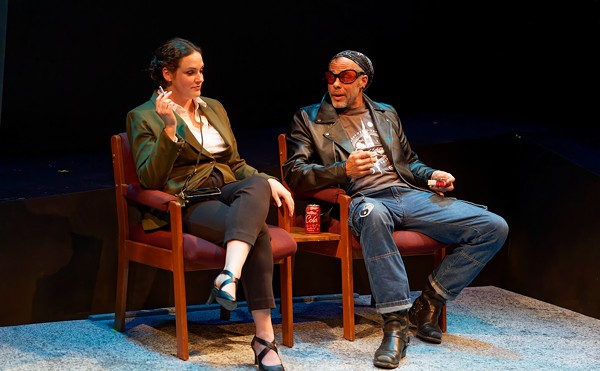Wurdack presents such unglamorous depictions of the stage actor's career throughout her film. You see stage couples attending voice rehearsals, and while Mom sings, Dad tries to mollify their fidgety child. You see Gary Lynch, one of the principal storytellers in the documentary, and his wife packing up their New York apartment to go on the "big adventure": the touring production of Mamma Mia, in which he stars and for which they will bring their toddler to live, a few months at a time, in cities across North America.
Actors have long been regarded as less-than-solid citizens (even deserving of banishment in more fundamentalist times and places), but Wurdack has selected for her examination a group of midcareer performers who want what most people want: family, home, enough money to pay the bills, a fulfilling career. It's not surprising that Wurdack is just that sort. Interviewed in her parents' Webster Groves home with dogs and cats entering and exiting the living room, kids watching TV behind doors that won't stay closed and telephones ringing a trilling assortment of sounds, Wurdack is a slender, pretty woman with evident stores of pluck, initiative and ambition.
The Road to Broadway begins with a brief synopsis of the Theater Factory, an Equity company that played 10 summers in St. Louis, 1983-92. Almost all the actors whose stories are told in the film worked with the Theater Factory, which Wurdack founded at the more-ambition-than-good-sense age of 23. Although the performers are not all Midwesterners (many came to the Theater Factory from the Circle in the Square acting school in New York, of which Wurdack is also an alum) there's a strain of heartland values to their stories and to Wurdack. "These are all my friends," she says, "and one of the reasons I picked them was that people think actors are all out drinking champagne, but they're very normal people. They have children."
The Wurdack family home worked as a setting for many of the interviews, both in keeping the budget tight and because "I like bright colors," says Wurdack. "We have purple rooms upstairs." Her parents make brief appearances in the film, with her father admitting the worries and anxieties that complicate his love for a daughter who's chosen such an uncertain career path.
Wurdack's solidity left a lasting impression on St. Louis benefactors. Although the Theater Factory hasn't taken to the boards in nearly a decade, when Wurdack sought funders for a movie about theater people (a paradox that isn't going to make for a stunning studio pitch), she found most of her investors here. She also found food and shelter for cast and crew. Those who once sewed costumes backstage for the Theater Factory volunteered their catering services, a welcome cost-cutter, even if their menu was not too diverse. "The word 'vegetarian' in St. Louis language means 'vegetable lasagna,'" Wurdack observes. "All these different women were cooking it, and every day we were having vegetable lasagna."
Her crew wasn't complaining, though. LA cinematographer Jonathan Rho, who has beautifully shot The Road to Broadway, didn't want to leave St. Louis when it came time to shoot in New York. And the difference between shooting in St. Louis and New York? "You can't just leave things in your car" in the boroughs, reports Wurdack.
After shooting more than 100 hours of interviews with actors in St. Louis, LA, New York and Ivoryton, Conn. -- home of the United States' first summer-stock theater, where Celeste Holm, Katharine Hepburn and Julia Kiley (one of The Road to Broadway's principals) once performed -- Wurdack gleaned a narrative structure based on "the scheme of how a career works, which is, you fall in love with it as a kid, then do it in high school. Then you do semiprofessional theater, and then you move to New York and end up working outside of New York. Then you end up staying in New York and doing off-Broadway -- and many fall by the wayside all along, and then there are people who stick with it and have a life."
Two of the central figures in the documentary are Michael McGrath and Kiley. McGrath was one of the inspirations for the film. When Wurdack witnessed his Broadway opening night in Swinging on a Star, she thought, "If people only knew what it had taken to get him up there, they wouldn't believe it." The Road to Broadway shows some of McGrath's travails en route to the Great White Way, including a devastating near-miss: He'd been offered a role in the hit revue Jerome Robbins' Broadway, but, as McGrath deadpans in the film, the offer was rescinded because "Jerry had a bad dream about me."
McGrath sets foot in the theatrical equivalent of Mecca; Kiley gets desperately close. Moving from understudy to principal in Stephen Sondheim's Assassins, Kiley -- playing "Squeaky" Fromme -- gets the word that the show is moving from off-Broadway to Broadway. Then, just as suddenly, the investors pull out. She tells herself she's fine, until she realizes she hasn't gotten out of bed for a week.
It is really no cliché that the actor's life is a parade of broken dreams. In the making of the film, says Wurdack, "at one point it was really a Greek tragedy, and I said, 'This is too depressing.' It was finding that balance. From the beginning, I did not want to do 42nd Street, either." Even with a somber and poignant telling of the effect of AIDS on the lives and work of those in the profession (one actor tells of how every friend he had at 30 was dead by the time he reached 40; Kiley tells of how hospital waiting rooms were called "the Equity lounge"), The Road to Broadway remains a buoyant tale. McGrath and Kevin Chamberlin, one of those Theater Factory alums who continues on the ascent (with a 2000 Tony nomination for best actor in Dirty Blonde), are marvelous storytellers. Chamberlin, who could be the reincarnation of Bert Lahr, sits around a table at Barrymore's in Manhattan with fellow actors, reminiscing about F. Murray Abraham's penchant for hiding his Oscar onstage, then handing it to Chamberlin midscene. The incomparable dancer Scott Wise offers an example of the humility of the profession: After he won his Tony for Jerome Robbins' Broadway, his next gig was donning a Teenage Mutant Ninja Turtle costume and dancing at a birthday party.
Wurdack's film en-compasses the grist and glitter of the profession. One actor questions why he hasn't gotten his break. Another borrows a subway token to an audition and gets cast in A Chorus Line. Celeste Holm reminisces fondly about the Ivoryton Playhouse, as does Kiley -- doing a dead-on impersonation of Hepburn visiting the dressing rooms the star inhabited one summer. The stately character actor Michael Allinson speaks resignedly of a career based on being the substitute for Rex Harrison in My Fair Lady; Chamberlin can barely believe his ears when he learns of his Tony nomination. The film also features Joneal Joplin, which is a St. Louis requirement. New Yorker film critic Anthony Lane once wrote that for a decade of French film, any movie without Gérard Depardieu in it seemed to have a hole. So it is with Joplin and any film on acting with a St. Louis backdrop.
The Road to Broadway begins with the irritating feel of a home movie -- too much warmth and not enough light -- but soon the sentimentality turns to sentiment, and a life in the theater is made more real, yet no less magical, under Wurdack's clear gaze.





